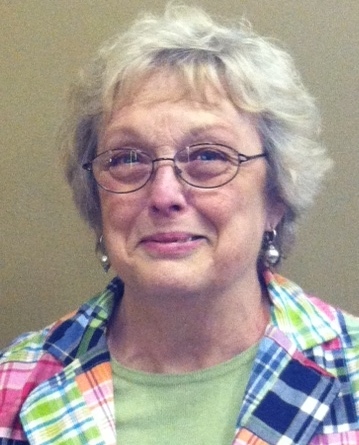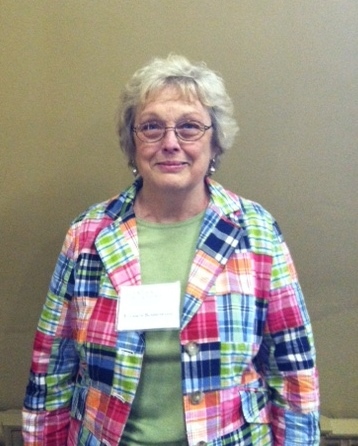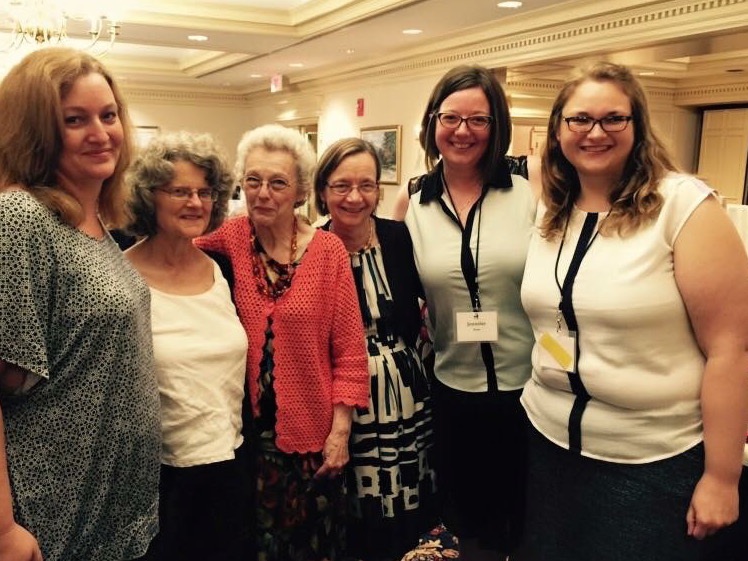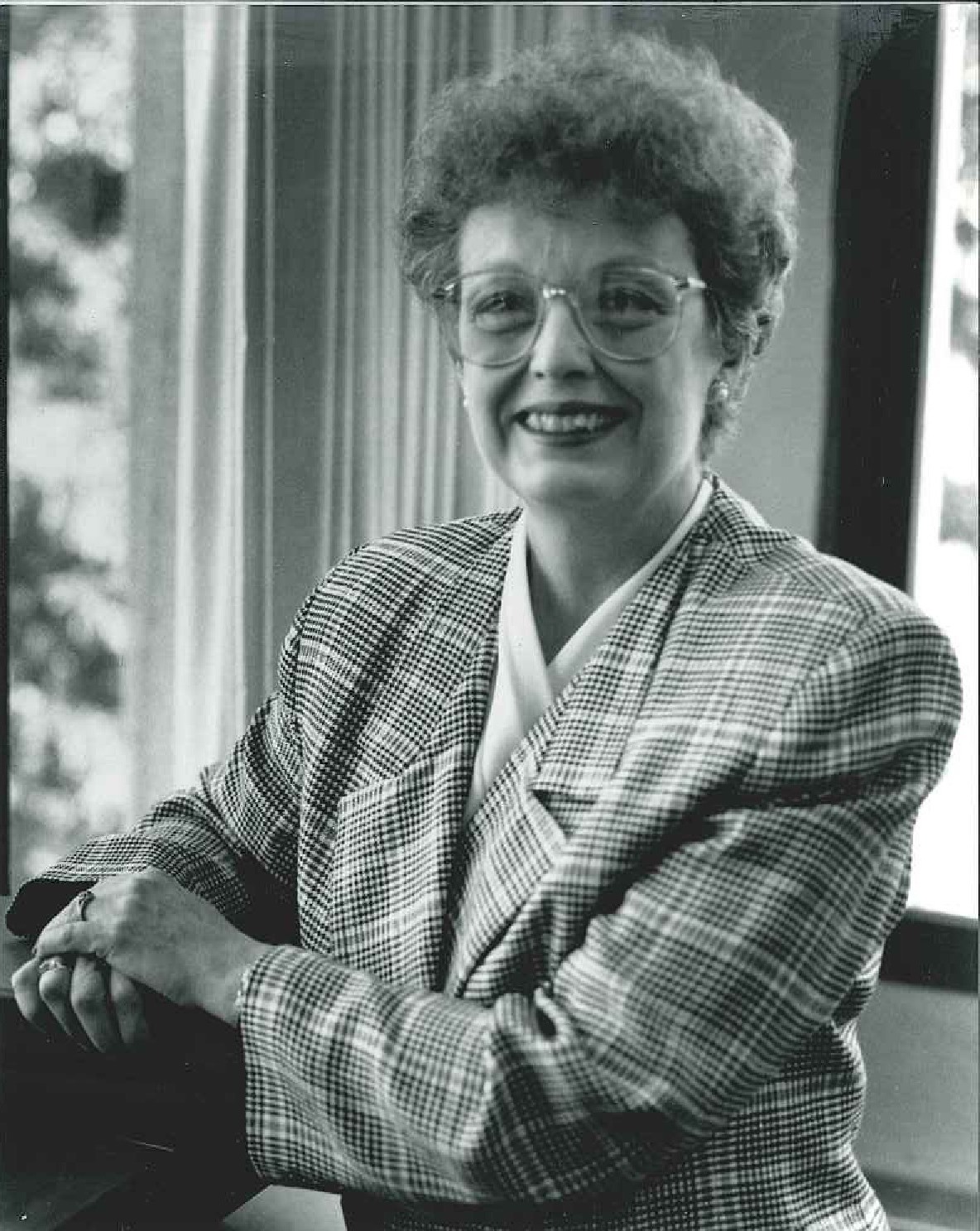Profile

Elizabeth Scarborough
Birth:
1935
Death:
2015
Training Location(s):
PhD, University of New Hampshire (1972)
MA, University of New Hampshire (1966)
BA, Hardin-Simmons University (1956)
Primary Affiliation(s):
Indiana University South Bend (1991-2000)
State University of New York, Fredonia (1977-1991)
Northern Illinois University (1972-1976)
Psychology’s Feminist Voices Oral History Interview:
Career Focus:
History of psychology; women's history; history of women in psychology.
Biography
As a graduate student in psychology in the late 1960s, Elizabeth Scarborough (Goodman) became an excellent juggler. Married to a university professor who ate three meals a day at home - which she prepared - and raising two young children, she also found time to devote to her studies. In fact, Scarborough became so skilled at managing the household and working around everyone's schedules while simultaneously being a graduate student and teaching part-time that she recalled, "[W]e were sitting at the table for dinner [one night] and I said something about something that happened in my class. And my daughter says 'Oh, are you teaching this semester?'"
Reflecting upon what drew her to psychology, and more particularly to the history of psychology, Scarborough noted that she just "fell into it". She had completed a bachelor's degree in psychology years earlier, and when her husband was offered a job in New Hampshire she decided to enroll in the Psychology Department's Master's program. She felt that being a married woman placed her at both an advantage and disadvantage in academia. In terms of benefits, she felt that one of the reasons she was offered a PhD placement in New Hampshire's new doctoral program in the history of psychology was due not only to her performance as a Master's student, but because she was seen as 'place-bound'. Her husband was a faculty member in the Dept. of Home Economics, so it was deemed unlikely that she would relocate before completing her training. In terms of drawbacks, the school declined to offer her any financial support. Because she was married, she was seen as "taken care of", so that despite her excellent academic record she was routinely passed over for awards or scholarships. She also regretted that as a busy wife and mother she was unable to experience and participate in the informal student gatherings and discussions that made graduate school come alive.
Scarborough recalled finding it difficult to choose a supervisor in the PhD program because of her status as both an older student and a faculty wife: "[M]y husband was an associate professor, he was older. I was as old as many of the professors in the Psychology Department. In terms of academic status, I was a spouse, I kind of outranked them. It was very awkward." Fortunately the department hired Robert Watson, who was a well-known figure in the field of the History of Psychology. While she did not know anything at the time about history, let alone the history of psychology, Scarborough felt Watson would be the perfect supervisor. She dreaded committing to a specific theoretical orientation and felt that historical research would allow her to avoid such constraints. In the summer of 1968, Watson and colleague Josef Brozek secured National Science Foundation funding for a summer institute on teaching the history of psychology. Scarborough participated in the institute, the success of which would lead to the founding of a new society to promote scholarship in the area. It was christened Cheiron, after the wise centaur of Greek mythology. Thereafter, Scarborough never missed a meeting.
Upon completing her PhD in 1972, Scarborough accompanied her husband to his new position at Northern Illinois University. Unfortunately although this new job offered him career advancement, Scarborough was offered only occasional part-time teaching. She kept busy through her continued involvement in the brand new Cheiron society (now Cheiron, the International Society for the History of the Social and Behavioral Sciences), and she taught part-time whenever she could.
During this time, Scarborough was asked to write a paper on the history of women in psychology, a topic that had barely been touched by historians. At the time there were only three known figures: Christine Ladd-Franklin, Mary Whiton Calkins, and Margaret Floy Washburn. Admittedly, Scarborough herself had little awareness of or interest in the topic. But along with her collaborator Laurel Furumoto, she discovered that there were many other forgotten women in the first generation of American women psychologists, and this led to 10 years of research. With the women's movement gaining momentum, and the field of women's history bursting open, a publisher approached them about their project before they had even contemplated writing a book proposal. The result was their now-classic book, Untold Lives: The First Generation of American Women Psychologists, published in 1987. It provides rich contextual analyses of the lives and struggles of the group of early women who comprised the first generation of American female psychologists.
Scarborough continued to struggle with her part-time position. She and her husband discussed relocating to wherever she could find an academic job, and having him open a private practice in marriage counseling. This plan did not materialize, however, because it didn't seem feasible to give up her husband's income as a tenured professor. Soon, it became clear to Scarborough that she needed not only a job, but also a divorce. With this in mind, she interviewed for several jobs in various locations. When she was offered a position at Fredonia University she filed for divorce. Six weeks after her job interview she was moving to New York State. Her children stayed behind, as her son did not want to move and her daughter was 18 and starting college. Scarborough remembers, "[M]y daughter and I joked that we both went away to college at the same time."
Although at the time Scarborough felt she was functioning well, in hindsight she feels that in her first year at Fredonia she was a "zombie". She loved it, but her first year of teaching was "disastrous". She was 42 at the time, and while she was a new faculty member, she had the advantage of maturity. Also, because she had been married to an academic, she had learned a great deal about university administration, which proved to be very helpful in her own career. She was quickly offered a chair position in her department and enjoyed the administrative work immensely.
As a graduate student, Scarborough could relate to the struggles of the women she wrote about in Untold Lives. At the time she felt pulled in two directions - towards academia and career on the one hand, and family on the other. By the time she landed her first tenure-track position, she was operating as a single person. Her professional work could be given her full attention and she did not feel divided. Her days as a full-time juggler were over.
Scarborough went on to become the Dean of Liberal Arts and Sciences at Indiana University South Bend and has devoted her research career to the history of women in psychology. From 1973-1980 she was the Executive Officer of Cheiron, the Society she helped found, and in 1990-1991 she was President of the Society for the History of Psychology. She was a fellow of the American Psychological Association and the Association for Psychological Science. She was a member of the advisory board of the Cummings Center for the History of Psychology. In honor of her steadfast support and significant contributions to the history of psychology, Cheiron named its annual keynote address the Scarborough Memorial Lecture.
Ever commited even during a long illiness, she attended her last Cheiron conference with the help of palliative care in Lawrence, Kansas in June 2015. Elizabeth Scarborough passed away in South Bend, Indiana, August 2015 .
by Jenna MacKay (2010) Updated (2015)
To cite this article, see Credits
Selected Works
Scarborough, E. (2005). Constructing a women's history of psychology. The Feminist Psychologist, 32(1), p. 6.
Scarborough, E. (2003). Cheiron's origins: Personal recollections and a photograph. Journal of the History of the Behavioral and Social Sciences, 40, 207-211.
Scarborough, E. (1994). Recognition for women: The problem of linkage. Annals of the New York Academy of Sciences, 727, 101-111.
Scarborough, E. (1992). Mrs. Ricord and psychology for women, circa 1840. American Psychologist, 47, 274-280.
Scarborough, E. (1990). Margart Floy Washburn. In A. N. O'Connell & N. Felipe Russo (Eds.), Women in psychology: A bio-bibliographic sourcebook (pp. 342-349). Westport, CT: Greenwood Press.
Scarborough, E. (1988). The history of psychology course. In P. Bronstein & K. Quina (Eds.), Teaching the psychology of persons: Resources for gender and sociocultural awareness (pp. 88-98). Washington, DC: American Psychological Association.
Furumoto, L. & Scarborough, E. (1987). Placing women in the history of comparative psychology: Margaret Floy Washburn and Margaret Morse Nice. In E. Tobach (Ed.), Historical perspectives and the international status of comparative psychology (pp. 103-117). Hillsdale, NJ: Erlbaum.
Scarborough, E. & Furumoto, L. (1987). Untold lives: The first generation of American women psychologists. New York: Columbia University Press.
Furumoto, L. & Scarborough, E. (1986). Placing women in the history of psychology: The first American women psychologists. American Psychologist, 41, 35-42.
Goodman, E. S. (1980). Margaret F. Washburn (1871-1939): First woman Ph.D. in psychology, Psychology of Women Quarterly, 5, 69-80.
Photo Gallery




Elizabeth Scarborough
Birth:
1935
Death:
2015
Training Location(s):
PhD, University of New Hampshire (1972)
MA, University of New Hampshire (1966)
BA, Hardin-Simmons University (1956)
Primary Affiliation(s):
Indiana University South Bend (1991-2000)
State University of New York, Fredonia (1977-1991)
Northern Illinois University (1972-1976)
Psychology’s Feminist Voices Oral History Interview:
Career Focus:
History of psychology; women's history; history of women in psychology.
Biography
As a graduate student in psychology in the late 1960s, Elizabeth Scarborough (Goodman) became an excellent juggler. Married to a university professor who ate three meals a day at home - which she prepared - and raising two young children, she also found time to devote to her studies. In fact, Scarborough became so skilled at managing the household and working around everyone's schedules while simultaneously being a graduate student and teaching part-time that she recalled, "[W]e were sitting at the table for dinner [one night] and I said something about something that happened in my class. And my daughter says 'Oh, are you teaching this semester?'"
Reflecting upon what drew her to psychology, and more particularly to the history of psychology, Scarborough noted that she just "fell into it". She had completed a bachelor's degree in psychology years earlier, and when her husband was offered a job in New Hampshire she decided to enroll in the Psychology Department's Master's program. She felt that being a married woman placed her at both an advantage and disadvantage in academia. In terms of benefits, she felt that one of the reasons she was offered a PhD placement in New Hampshire's new doctoral program in the history of psychology was due not only to her performance as a Master's student, but because she was seen as 'place-bound'. Her husband was a faculty member in the Dept. of Home Economics, so it was deemed unlikely that she would relocate before completing her training. In terms of drawbacks, the school declined to offer her any financial support. Because she was married, she was seen as "taken care of", so that despite her excellent academic record she was routinely passed over for awards or scholarships. She also regretted that as a busy wife and mother she was unable to experience and participate in the informal student gatherings and discussions that made graduate school come alive.
Scarborough recalled finding it difficult to choose a supervisor in the PhD program because of her status as both an older student and a faculty wife: "[M]y husband was an associate professor, he was older. I was as old as many of the professors in the Psychology Department. In terms of academic status, I was a spouse, I kind of outranked them. It was very awkward." Fortunately the department hired Robert Watson, who was a well-known figure in the field of the History of Psychology. While she did not know anything at the time about history, let alone the history of psychology, Scarborough felt Watson would be the perfect supervisor. She dreaded committing to a specific theoretical orientation and felt that historical research would allow her to avoid such constraints. In the summer of 1968, Watson and colleague Josef Brozek secured National Science Foundation funding for a summer institute on teaching the history of psychology. Scarborough participated in the institute, the success of which would lead to the founding of a new society to promote scholarship in the area. It was christened Cheiron, after the wise centaur of Greek mythology. Thereafter, Scarborough never missed a meeting.
Upon completing her PhD in 1972, Scarborough accompanied her husband to his new position at Northern Illinois University. Unfortunately although this new job offered him career advancement, Scarborough was offered only occasional part-time teaching. She kept busy through her continued involvement in the brand new Cheiron society (now Cheiron, the International Society for the History of the Social and Behavioral Sciences), and she taught part-time whenever she could.
During this time, Scarborough was asked to write a paper on the history of women in psychology, a topic that had barely been touched by historians. At the time there were only three known figures: Christine Ladd-Franklin, Mary Whiton Calkins, and Margaret Floy Washburn. Admittedly, Scarborough herself had little awareness of or interest in the topic. But along with her collaborator Laurel Furumoto, she discovered that there were many other forgotten women in the first generation of American women psychologists, and this led to 10 years of research. With the women's movement gaining momentum, and the field of women's history bursting open, a publisher approached them about their project before they had even contemplated writing a book proposal. The result was their now-classic book, Untold Lives: The First Generation of American Women Psychologists, published in 1987. It provides rich contextual analyses of the lives and struggles of the group of early women who comprised the first generation of American female psychologists.
Scarborough continued to struggle with her part-time position. She and her husband discussed relocating to wherever she could find an academic job, and having him open a private practice in marriage counseling. This plan did not materialize, however, because it didn't seem feasible to give up her husband's income as a tenured professor. Soon, it became clear to Scarborough that she needed not only a job, but also a divorce. With this in mind, she interviewed for several jobs in various locations. When she was offered a position at Fredonia University she filed for divorce. Six weeks after her job interview she was moving to New York State. Her children stayed behind, as her son did not want to move and her daughter was 18 and starting college. Scarborough remembers, "[M]y daughter and I joked that we both went away to college at the same time."
Although at the time Scarborough felt she was functioning well, in hindsight she feels that in her first year at Fredonia she was a "zombie". She loved it, but her first year of teaching was "disastrous". She was 42 at the time, and while she was a new faculty member, she had the advantage of maturity. Also, because she had been married to an academic, she had learned a great deal about university administration, which proved to be very helpful in her own career. She was quickly offered a chair position in her department and enjoyed the administrative work immensely.
As a graduate student, Scarborough could relate to the struggles of the women she wrote about in Untold Lives. At the time she felt pulled in two directions - towards academia and career on the one hand, and family on the other. By the time she landed her first tenure-track position, she was operating as a single person. Her professional work could be given her full attention and she did not feel divided. Her days as a full-time juggler were over.
Scarborough went on to become the Dean of Liberal Arts and Sciences at Indiana University South Bend and has devoted her research career to the history of women in psychology. From 1973-1980 she was the Executive Officer of Cheiron, the Society she helped found, and in 1990-1991 she was President of the Society for the History of Psychology. She was a fellow of the American Psychological Association and the Association for Psychological Science. She was a member of the advisory board of the Cummings Center for the History of Psychology. In honor of her steadfast support and significant contributions to the history of psychology, Cheiron named its annual keynote address the Scarborough Memorial Lecture.
Ever commited even during a long illiness, she attended her last Cheiron conference with the help of palliative care in Lawrence, Kansas in June 2015. Elizabeth Scarborough passed away in South Bend, Indiana, August 2015 .
by Jenna MacKay (2010) Updated (2015)
To cite this article, see Credits
Selected Works
Scarborough, E. (2005). Constructing a women's history of psychology. The Feminist Psychologist, 32(1), p. 6.
Scarborough, E. (2003). Cheiron's origins: Personal recollections and a photograph. Journal of the History of the Behavioral and Social Sciences, 40, 207-211.
Scarborough, E. (1994). Recognition for women: The problem of linkage. Annals of the New York Academy of Sciences, 727, 101-111.
Scarborough, E. (1992). Mrs. Ricord and psychology for women, circa 1840. American Psychologist, 47, 274-280.
Scarborough, E. (1990). Margart Floy Washburn. In A. N. O'Connell & N. Felipe Russo (Eds.), Women in psychology: A bio-bibliographic sourcebook (pp. 342-349). Westport, CT: Greenwood Press.
Scarborough, E. (1988). The history of psychology course. In P. Bronstein & K. Quina (Eds.), Teaching the psychology of persons: Resources for gender and sociocultural awareness (pp. 88-98). Washington, DC: American Psychological Association.
Furumoto, L. & Scarborough, E. (1987). Placing women in the history of comparative psychology: Margaret Floy Washburn and Margaret Morse Nice. In E. Tobach (Ed.), Historical perspectives and the international status of comparative psychology (pp. 103-117). Hillsdale, NJ: Erlbaum.
Scarborough, E. & Furumoto, L. (1987). Untold lives: The first generation of American women psychologists. New York: Columbia University Press.
Furumoto, L. & Scarborough, E. (1986). Placing women in the history of psychology: The first American women psychologists. American Psychologist, 41, 35-42.
Goodman, E. S. (1980). Margaret F. Washburn (1871-1939): First woman Ph.D. in psychology, Psychology of Women Quarterly, 5, 69-80.



